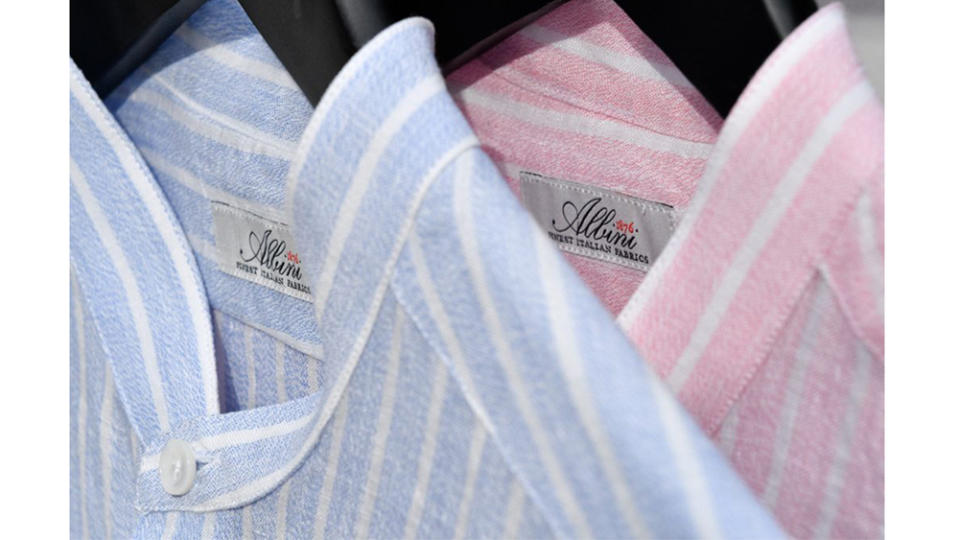How a 140-Year-Old Shirting Mill Is Leading Menswear’s Sustainability Effort

Click here to read the full article.
In large parts of the men’s fashion industry, the sustainability conversation still feels like an afterthought. Behind oil production, fashion is the second biggest polluter on the planet and menswear brands are lagging behind their womenswear equivalents when it comes to cleaning up their manufacturing processes, reducing air miles and rethinking the use of high-impact materials.
In womenswear, brands like Stella McCartney have made significant steps to reduce their carbon footprint in recent months (McCartney has now removed all virgin cashmere from its collections, which has reduced the brand’s annual air miles by 20 percent alone), while a whole generation of start-up brands like Bite and People Tree has launched to offer women low-impact clothes made from organic materials. Most men’s brands, by contrast, seem eerily quiet on the subject of sustainability.
More from Robb Report
Why the Most Interesting Tailored Jackets You Can Buy Right Now Aren't Sport Coats
How the Camp Collar Shirt Became a Go-to Warm Weather Option for Stylish Guys Everywhere
Robb Recommends: Scott Fraser's Breezy Wide-Leg Trousers and Lido Shirts Are Ready for Spring
Thankfully, some exceptions break this rule. Albini isn’t a name you’re likely to know, but it is nonetheless an important one. The company is a luxury shirting mill in Italy that weaves high-end fabrics primarily for use in luxury menswear. Not only is Albini a key player in the menswear market, but it’s also a center for sustainability research, development and proactive change. If you care about the way your clothes are made, it’s a name to look out for whether you’re shopping on Madison Avenue or visiting your shirtmaker on Jermyn Street. [Editor’s note: Albini has been a sponsor of the author’s podcast, HandCut Radio, in the past.]

The company was founded in Albino, a small town north of Milan, in 1876. The company is 5th generation family-owned and run today, employs 1,400 people worldwide and is fully vertically integrated. This means that Albini’s production process is overseen internally from beginning to end. Most fabric mills buy raw material from external suppliers or use external specialists to wash and finish their fabrics before shipping them, but Albini owns (or at the very least rents) all the cotton fields it uses, spins and dyes its own yarn, weaves and then finishes its fabrics entirely in-house.
This complete ownership of the manufacturing process gives Albini significant clout when it comes to sustainability. “We can be completely transparent with brands and consumers,” says the company’s president, Stefano Albini. “If we weren’t fully integrated, we’d have struggled to undertake most of the projects that we’ve worked through over the past few years.”
Certainly, the company’s made a significant amount of progress in a short space of time. In July last year, Albini founded the world’s first dedicated textile technology think tank, which today provides a workspace and research facilities to bioengineers, sustainability experts and textile designers. It’s called Albini Next, and it’s on a roll.
“We’re focusing on three main study areas,” Albini explains, “the development of natural dyes that require much less water to work with than conventional chemical dyes, recycling in its various forms and traceability projects for all our fabrics.” In the eight short months, Albini Next has been active, its innovations include a solution for recycling cotton shirting off-cuts into paper and for up-cycling industrial waste nylon fibers into superfine shirting fabrics.
Albini Next has also undertaken significant work on the company’s supply chain, in partnership with Supima Cotton and Oritain’s traceability service. The mill now offers fabrics that are fully traceable right down to the field that an individual cotton plant was grown in, and is working hard to increase its use of organic cottons too. “In 2019 we invested directly in the cultivation of organic Supima in the US, to have a direct relationship with our farmers,” says Albini. “It’s important for us to know that our cotton is truly organic. We’re at the start of the chain in the fashion industry — if we don’t improve the sustainable credentials of our fabrics, fashion brands can’t improve their collections.”
These innovations in Albini’s operations are only the tip of the iceberg; the mill is also increasing the use of organic linen and natural Tencel (a silk-like fabric made from recycled wood pulp), reducing its energy consumption, recycling wastewater and challenging the use of pesticides to grow natural fibers in America and Egypt. In this sense, Albini is streaks ahead of the menswear brands it supplies, although some menswear brands are starting to cotton-on — pardon the pun.
“When we launched our organic cotton collection 10 years ago, the market didn’t even consider it — we were probably too ahead of the curve back then,” says Albini. “Now, brands are starting to respond to our organic products. As a mill, we sell more than fabric; we sell a way of operating within fashion that fully respects the environment and our people. Finally, we’re seeing that the men’s market is starting to ask for this.”
Best of Robb Report
Sign up for Robb Report's Newsletter. For the latest news, follow us on Facebook, Twitter, and Instagram.

